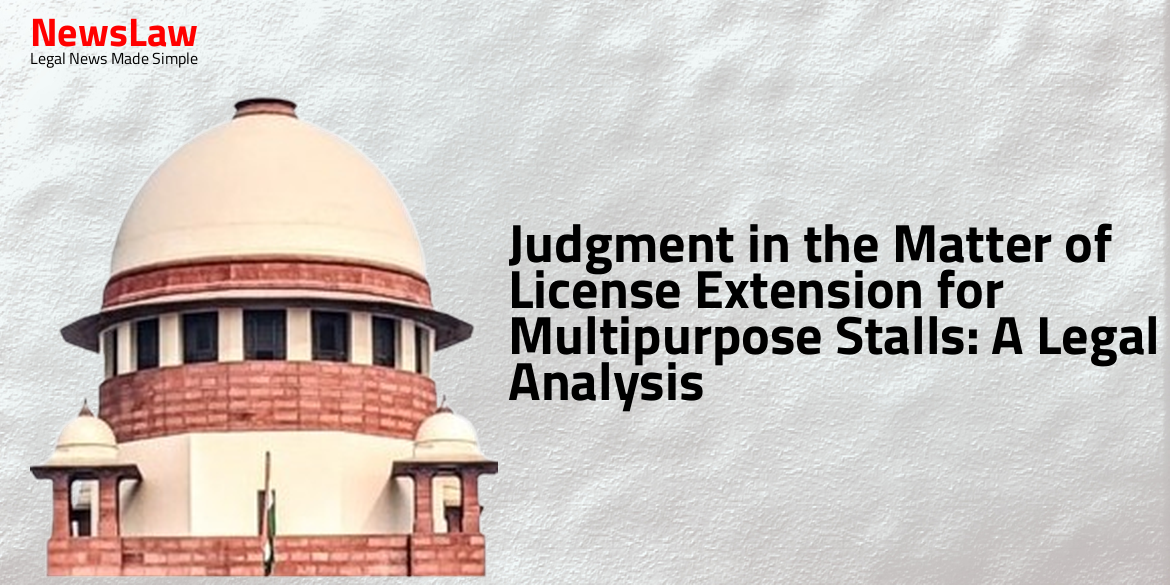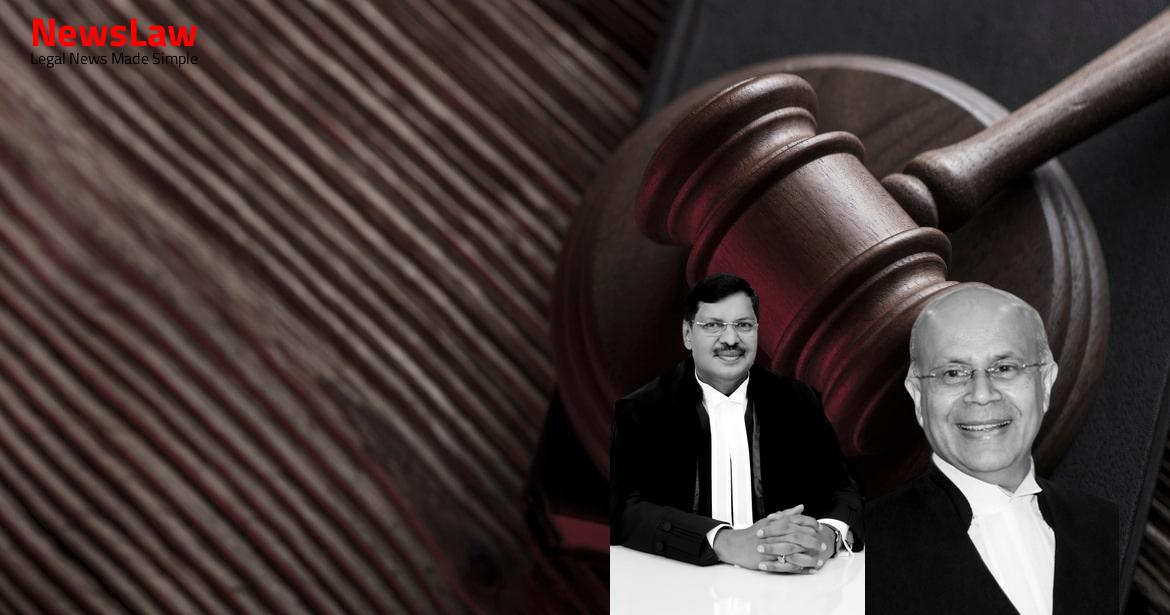In a significant legal case before the Supreme Court of India, the dispute between the landlord and tenant was examined in depth. The case involved the petitioner-applicant, the landlord, seeking ejectment of the respondent-tenant due to alleged non-payment of rent, resulting in lease forfeiture. The Court’s decision revolved around the interpretation of Rent Control Legislation, emphasizing the need to balance the rights of both parties effectively. This case sheds light on the evolving legal framework governing landlord-tenant disputes in India.
Facts
- Petitioner-applicant initiated proceedings for ejectment under the T.P. Act due to lease forfeiture.
- Special Leave Petitions were filed before the Supreme Court challenging the judgment of the learned Single Judge.
- The judgment and order dated 7 November 2019 passed in C.O.Nos.1582-85 of 2019 by the High Court of Calcutta are being challenged.
- The challenge is based on alleged non-payment of rent.
Issue
- The Single Judge’s decision in the landlord-tenant dispute pertained to the application of either the West Bengal Tenancy Act, 1997 or the Transfer of Property Act, 1882 for framing the issues
- It was determined that the Tenancy Act would govern the framing of issues in the present case
- This ruling signifies the specific legal framework that will be used to address and resolve the dispute between the landlord and tenant involved
Also Read: Paul v. X: Anticipatory Bail Appeal Success
Arguments
- The respondent-tenant filed an application seeking the rejection of the plaint on the grounds of jurisdiction.
- The respondent-tenant argued that the premises should be governed under the Tenancy Act.
- The respondent-tenant alleged that possession has been sought in respect of a lease that is yet undetermined.
- The respondent-tenant claimed that the suit is bad in law, illegal, and arbitrary.
- The respondent-tenant raised concerns about the misvaluation of the suit and insufficient stamping of the plaint.
Also Read: State vs. Periyasamy and R. Manoharan: Right of Private Defence
Analysis
- The appellate court can put the appellant tenant on terms and direct them to compensate the landlord with a reasonable amount, not necessarily the contractual rate of rent.
- The income of a landlord remaining static or yielding no income can cause grievance, subject to the agreement with the tenant.
- Proceedings in aid of final proceedings are not on par with supplemental proceedings which may not impact the ultimate result of the suit.
- Applicant for an order of stay must do equity for seeking equity based on Martin and Harris (Supra).
- The court directed the trial court to frame issues relating to the maintainability of the suit and applicability of enactments as a preliminary issue.
- The Trial Court answered issues in favor of the plaintiff based on the creation date of the tenancy and the governing law.
- High Court dismissed four suits of the plaintiff on the grounds of maintainability.
- The High Court decision holding the respondent to be governed by the Tenancy Act was upheld.
- The appellate court has the power to put the appellant tenant on terms while exercising jurisdiction under Order 41 Rule 5 of the Code.
- The landlord sought payment based on the prevalent market rate for the rental property.
- The tenancy can be determined by both the landlord and the tenant.
- Determination by the landlord occurs when the landlord performs an act on the premises that is inconsistent with the tenancy.
- Examples of actions by a landlord that imply determination include re-entering to take possession, putting in a new tenant, or altering the premises without tenant consent.
- If a landlord performs an act off the premises inconsistent with the tenancy, such as conveying the reversion or granting a new lease to start immediately, the tenancy may also be determined.
- Notice to the tenant is required for an act done off the premises to determine the tenancy.
- Forfeiture, as defined, is the lessor’s right to terminate a lease due to the lessee’s breach of covenant or wrongful act.
- The Court observed a definite shift in the approach towards interpreting rent control legislations.
- Earlier judgments heavily favored tenants to protect them against exploitation by landlords.
- However, courts should now also consider the interest of landlords while interpreting such provisions.
- The issue of payment of mesne profit arises when a decree of eviction is passed and stayed.
- The decree of eviction terminates the tenancy, and the landlord becomes entitled to mesne profits.
- The amount of mesne profits depends on various factors like property location, nature, and prevailing rent rates.
- Tenants are liable to pay rent equivalent to mesne profits from the date their right to possession ceases.
- Incidental power to grant stay on execution proceedings is subject to the final outcome of the case.
- Tenants must vacate the premises upon suffering an eviction order.
- The Court emphasized the importance of balancing the rights of both tenants and landlords in rent control cases.
- Majority of cases are filed because landlords do not get reasonable rent similar to market rent.
- Litigation is initiated due to dissatisfaction with rent amounts.
- Landlords may take legal action for not receiving rent in line with market rates.
Decision
- The rent should be just, proper, and adequate considering various factors like location, type of construction, accessibility, parking space facilities, etc.
- Caution should be taken to ensure the rent does not unfairly benefit the landlord.
- Directions given in Interlocutory Applications are subject to the final outcome of the Special Leave Petitions.
- The demised premises’ location, agreed rent, alleged non-payment, and other factors are considered in calculating dues.
- Similar relief sought in other Interlocutory Applications are disposed of similarly.
- Special Leave Petitions are scheduled for appearance in July 2024.
- Consequences for non-compliance include wilful disobedience of the order.
- Amount received should be placed in a short-term, interest-bearing fixed deposit.
- Enhancements in property tax, water tax, maintenance charges, electricity charges are to be borne by the tenant.
- The tenant is directed to deposit a specific amount with the Court’s Registry within four weeks.
- Monthly occupational charges requested by the petitioner are specified.
- The property is in a commercial hub in Kolkata.
- The lease agreement dates back to 1991, with default on rent payment alleged since 2002.
- The tenant is granted immunity from eviction for five years if current market rent is paid.
- Rental adjustments and obligations for property tax, water tax, maintenance charges, and electricity charges are outlined.
- Suggestions for amicably resolving the dispute were discussed during the proceedings.
Case Title: BIJAY KUMAR MANISH KUMAR HUF Vs. ASHWIN BHANULAL DESAI (2024 INSC 445)
Case Number: SLP(C) No.-004049 – 2020




Supreme Court Judgement dated 17.05.2024
Bijay Kumar Manish Kumar HUF vs Ashwin Bhanulal Desai
SLP(C) 4049 of 2020
Analysis by Arvind Agarwalla
19 May 2024
This is a Landmark Judgement passed by the Hon’ble Supreme Court and changes the entire landscape of the Tenancy and Lease matters in the country.
Finally, a balance has been struck between the rights of the Landlord and Tenant (by whatever name called). Right from the 1950s, Landlords have suffered untold misery at the hands of tenants, due to the draconian rent control laws in the country, driving the landlords to near bankruptcy.
This is a very unique judgement which has directed the tenants to pay INR 5.15 Crores being the Arrear Rent as per Market Rent (as per the Valuer’s Report) right from 2007 to 2024 at one stroke. The contractual rent of INR 800/- per month has been increased to INR 2,52,208 (315 times) by the Hon’ble Supreme Court, in an interlocutory application.
What is important to note is that the eviction suits filed by the landlords are not in existence as they have been dismissed by the Hon’ble Calcutta High Court in 2019. Hence, the Hon’ble Supreme Court has sent a very strong signal to the tenants that they must pay Market Rent if they wish to retain possession of the suit property.
The Judgement is applicable to all matters, whether they have been filed under the Rent Control Acts or under the Transfer of Property Act. This Judgement is binding upon all the Rent Control Courts, Rent Appellate Authorities, Civil Courts, Appeal Courts and High Courts in all matters relating to landlord and tenant.
This Judgement culls out the laws laid down in the following landmark judgements:
1. Atma Ram Properties vs Federal Motors (2005 (1) SCC 705)
2. State of Maharashtra vs Super Max International (2009 (9) SCC 772)
3. Achal Misra vs Ram Shanker Singh (2005 (5) SCC 531)
4. Achal Misra vs Ram Shanker Singh (2006 (11) SCC 498)
5. G L Vijain vs K Shankar (2006 (13) SCC 136)
6. Martin and Harris vs Rajendra Mehta (2022 (8) SCC 527
7. Indian Oil Corporation vs Sudera Realty (2022 SCC OnLine 1161)
The most significant principle laid down in this Judgement stems from Sudera Realty (supra) in which is was observed that mesne profits become payable on continuation of possession after ‘expiry’ of lease. This judgment lays down the law that ‘expiry’ includes the following conditions as well:
• Determination
• Forfeiture
• Termination
Hon’ble Supreme Court has laid down that as soon as any of these three words are applied to a lease, the rights of the lessee/tenant stand extinguished or in certain cases metamorphosed into weaker iteration of their former selves.
Example of “Tenant at Sufferance”
While a tenant may enter the property lawfully under a lease agreement, the status changes to “tenant at sufferance” upon expiry of the lease/tenancy. The status of a “tenant at sufferance” is a shade higher than a trespasser (who had entered the property unlawfully).
Implication of inclusion of these three words is that the tenant becomes liable to pay mesne profits under the following circumstances:
• Determination : if a tenancy/lease is determined by the Landlord for a valid reason
• Forfeiture : if the tenancy is forfeited for default in payment of rent
• Termination : if the Landlord determines the tenancy by way of a Sec 106 TP Act Notice
A very significant observation in the Judgement reads as follows:
“We also note that the location of demised premises is in the heart of Kolkata and if the submissions of the petitioner are to be believed, they have been deprived of rent for a considerable period of time. Taking a lock stock and barrel view of the present dispute, the averments and the documents placed before us, we may record a prima facie view, that the respondent-tenant has for the reasons yet undemonstrated, been delaying the payment of rent and/or other dues, payable to the petitioner-applicant landlord. This denial of monetary benefits accruing from the property, when viewed in terms of the unchallenged market report forming part of the record is undoubtedly substantial and as such, subject to just exceptions, we pass this order for deposit of the amount claimed by the petitioner-applicant, to ensure complete justice inter se the parties.”
This has a significant impact when:
• Tenant has not paid the contractual rent and other dues for a considerable period of time and has no explanation for such non-payment
• Continues to occupy a valuable property, especially commercial
• Landlord submits a Valuation Report to show the Market Rent for the property which is a substantial amount
In such circumstances, Landlord can apply to Court for payment of the entire Arrears at Market Rent. The Judgement has held that payment of entire Arrear Rent at Market Rent is to “ensure complete justice inter se the parties”.
Hon’ble Supreme Court has further observed as follows:
“After all, we cannot lose sight of the fact that the very purpose for which a property is rented out, is to ensure that the landlord by way of the property is able to secure some income. If the income remains static over a long period of time or in certain cases, as in the present case, yields no income, then such a landlord would be within his rights, subject of course, to the agreement with their tenant, to be aggrieved by the same.”
This observation is very significant as it finally recognizes the right of the landlord in terms of the following:
• Right to secure an income by way of rent
o refer to “right to livelihood” as guaranteed under Article 21 of the Constitution of India
o refer to Edger Ferus vs Abraham Ittycheria (SCC OnLine Ker 39) as confirmed by Hon’ble Supreme Court in 2009 SCC OnLine SC 1948
• Rent cannot be static over a long period of time
o refer to Mohammad Ahmed vs Atma Ram Chauhan (2011 (7) SCC 755)
• Rent must be paid to Landlord
o refer to several judgements where it has been held that payment of rent is a statutorily obligation cast upon the tenant
o Debasish Paul vs Amal Boral (2023 SCC OnLine SC 1356)
Finally, this Judgement has reiterated and set out the “guidelines” framed by the Hon’ble Supreme Court in the celebrated 2011 Judgement as follows:
“We are supported in our conclusion by the observations and guidelines issued by this Court in Mohammad Ahmed & Anr. v. Atma Ram Chauhan & Ors. We reproduce the ones relevant to the adjudication of the present dispute hereinbelow-
“21. According to our considered view majority of these cases are filed because the landlords do not get reasonable rent akin to market rent, then on one ground or the other litigation is initiated…
(i) The tenant must enhance the rent according to the terms of the agreement or at least by ten per cent, after every three years and enhanced rent should then be made payable to the landlord. If the rent is too low (in comparison to market rent), having been fixed almost 20 to 25 years back then the present market rate should be worked out either on the basis of valuation report or reliable estimates of building rentals in the surrounding areas, let out on rent recently.
(ii) Apart from the rental, property tax, water tax, maintenance charges, electricity charges for the actual consumption of the tenanted premises and for common area shall be payable by the tenant only so that the landlord gets the actual rent out of which nothing would be deductible. In case there is enhancement in property tax, water tax or maintenance charges, electricity charges then the same shall also be borne by the tenant only.
xxxx
(v) If the present and prevalent market rent assessed and fixed between the parties is paid by the tenant then the landlord shall not
be entitled to bring any action for his eviction against such a tenant at least for a period of 5 years. Thus for a period of 5 years the tenant shall enjoy immunity from being evicted from the premises.
(vi) The parties shall be at liberty to get the rental fixed by the official valuer or by any other agency, having expertise in the matter.
(vii) The rent so fixed should be just, proper and adequate, keeping in mind the location, type of construction, accessibility to the main road, parking space facilities available therein, etc. Care ought to be taken that it does not end up being a bonanza for the landlord.”
Conclusion:
• Above guidelines are binding upon all Rent Control Courts, Civil Courts and High Courts in all tenancy matters, whether under the Rent Control Acts or TP Act
• Above guidelines override any sections in the Rent Control Acts which do not conform to the guidelines
• Rent must be increased by Court as per above guidelines
• Fair Rent must be fixed by the Rent Controller as per above guidelines
• Where an appeal is pending before the Rent Appellate Authority against a Fair Rent fixation matter and the Landlord has submitted a Valuer’s Report, Appellate Court should order payment/deposit of the Rent at Market Rate pending appeal
• Where Landlord has filed an Eviction Suit after serving a Sec 106 TP Act Notice on tenant, Court should order payment/deposit of Interim Mesne Profits at Market Rate based on Valuer’s Report from the expiry of the Sec 106 TP Act Notice
• Even if Landlord does not serve Sec 106 TP Act Notice on Tenant and filed Eviction Suit, the summons being deemed to be Notice under Sec 106 TP Act (Nopany Investments vs Santokh Singh (HUF) – 2008 (2) SCC 728), Court should order payment/deposit of Interim Mesne Profits at Market Rate based on Valuer’s Report from date of summons
• Where Landlord has filed Eviction Suit under Rent Control Act for default in payment of rent and tenant fails to deposit “admitted rent” within the statutory period of one month from summons, Court must direct Tenant to pay Rent at Market Rate from the expiry of one month from expiry of the one month period (refer Sec 7(1) of The West Bengal Premises Tenancy Act 1997) since the right of tenant to occupy the property extinguishes from such date
• In all cases where there is a decree for Arrear Rent, Court ought not to stay such Order
• In all cases where there is a decree for Arrear Rent and appeal is pending, Appellate Court must direct tenant to pay Arrear Rent, failing which contempt will lie
• All Courts ought to follow the Hon’ble Supreme Court Judgement where it has directed Tenant to pay Entire Arrears of Rent at Market Rate within 4 weeks, failing which contempt will lie
— x —